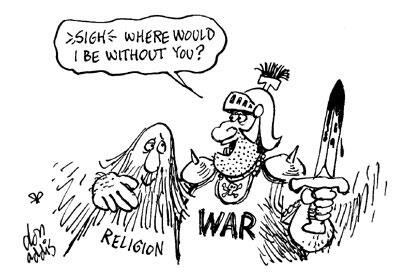Welcome to DU!
The truly grassroots left-of-center political community where regular people, not algorithms, drive the discussions and set the standards.
Join the community:
Create a free account
Support DU (and get rid of ads!):
Become a Star Member
Latest Breaking News
General Discussion
The DU Lounge
All Forums
Issue Forums
Culture Forums
Alliance Forums
Region Forums
Support Forums
Help & Search
Religion
Related: About this forumIs the advancement of human rights despite religions rather than because of them?

The Ten Commandments is often cited as the perfect essence and distillation of both human rights and human obligations. But I think that we can all agree that the Ten Commandments is somewhat flawed. After all, within the Ten Commandments there is nothing about the rights of children, or the rights of slaves, or of women. It does, or course, talk about women but in only in terms of not coveting a neighbour’s wife, alongside his ass. As the basis of Judeo-Christian faith, it is hardly a beacon of equality is it? The reality is that within the scope of women’s rights, gay rights, reproductive rights, abolition of slavery, in fact at every stage in the advancement of human rights there are been significant elements within most, if not all, religious institutions that have opposed the advancement of individual communities’ fight for equality within the wider community.
Article one of the Universal Declaration of Human Rights states:
All human beings are born free and equal in dignity and rights. They are endowed with reason and conscience and should act towards one another in a spirit of brotherhood.
The specific rights and freedoms granted in the full 30 articles of the declaration are intended for everyone, everywhere, irrespective of their race, colour, sex, language, religious opinion, property, birth or any other status. In effect, it strips away any religious or cultural affiliation in the expected advancement of Human Rights worldwide, something which by their very nature religious institutions are unable and unwilling to do.
It could be argued, from both an historic and contemporary standpoint, that the single biggest global threat to human rights is organised religion. While one can certainly recognise that not all people of faith support their leadership worst excesses, it is none-the-less true that human rights abuses are perpetrated by organised religion, against women, gay people and religious and ethnic minorities. A contemporary example here in the UK is where pretty much all religious institutions opposed the rights of gay people to marry, whereas 55% of people of faith supported these rights. Human rights seem to trump religious rights within a contemporary individual faith context in this example.
To be fair, it is obvious to even the most casual observer that some people of faith have offered huge inspiration in a human rights context, think a Ghandi or a Martin Luther King, and it is right to acknowledge that some people of faith have stood bravely and firmly for human rights advancement. However, overall it seems that wherever religion has held power and influence it has been complicit or active in the abuse of human rights. In that context, surely, the advancement of human rights is largely despite religions rather than because of them. Human rights cannot sit comfortably within a faith construct as by the very nature of a religious institution they will put their followers and their tenants of faith above all else, even if that means inequality of a group outside of their faith community.
Just sayin'
InfoView thread info, including edit history
TrashPut this thread in your Trash Can (My DU » Trash Can)
BookmarkAdd this thread to your Bookmarks (My DU » Bookmarks)
3 replies, 1208 views
ShareGet links to this post and/or share on social media
AlertAlert this post for a rule violation
PowersThere are no powers you can use on this post
EditCannot edit other people's posts
ReplyReply to this post
EditCannot edit other people's posts
Rec (7)
ReplyReply to this post
3 replies
 = new reply since forum marked as read
Highlight:
NoneDon't highlight anything
5 newestHighlight 5 most recent replies
= new reply since forum marked as read
Highlight:
NoneDon't highlight anything
5 newestHighlight 5 most recent replies
Is the advancement of human rights despite religions rather than because of them? (Original Post)
Soph0571
Jun 2018
OP
Duppers
(28,134 posts)1. Excellent, Soph.
Hats off to you.
This is the kind of thesis I'd love to pass on to certain people in my life but it'd only make them angry - rather like discussing facts and logic with republicans.
Act_of_Reparation
(9,116 posts)2. Religions are largely traditionalist institutions.
Traditionalists tend be resistent to change. It's true religious people have played major roles in virtually every social justice movement on the record, but it's worth pointing out that they were most often taking a stand against other religious people. Case in point, while there are plenty of American Christians who support gay rights, anti-gay sentiment is nevertheless most strongly correlated with American Christians. That's not anything to be proud of.
trotsky
(49,533 posts)3. And the unique thing religion brings to the table...
is a justification for bad behavior that cannot be disproven. Many believers take specific pride in this, that their beliefs are a "different way of knowing," and that secular reasoning is not only inferior but wholly incapable of analyzing religious belief.